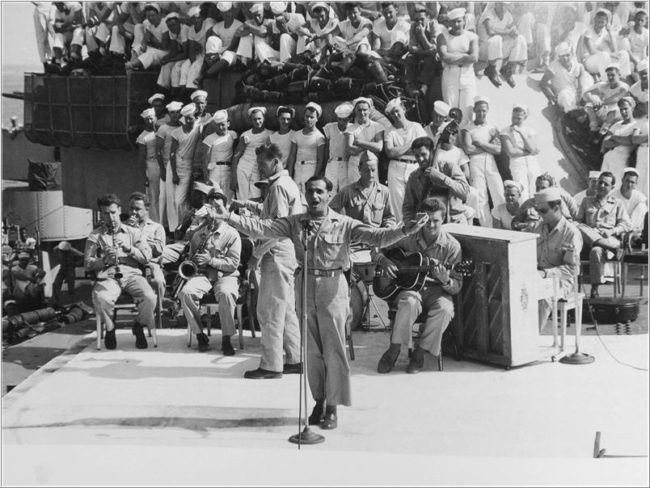
Irving Berlin Aboard the USS Arkansas 1944
I’m dreaming of a white . . . Hanukkah? No, that’s not how the most popular song ever written goes. Thanks to a Russian Jewish immigrant, we’re all dreaming of a white Christmas. So why was this Yiddish-speaking fellow not dreaming of a light Hanukkah instead?
Irving Berlin—the man we have to thank for the nostalgic sentiment and imagery invoked by this beloved song—came to the United States as a child before the turn of the 20th century. He went on to become one of the most prolific composers of his time, writing close to a thousand songs and memorable hits that became a centerpiece of our American culture. Catchy songs like “Blue Skies” and “There’s No Business Like Show Business” are tunes that most of us can belt out for at least a line or two. And “God Bless America,” who doesn’t know that one?
Exactly when, where, and why Berlin wrote “White Christmas” is shrouded in speculation, but we do know that he wrote his songs to appeal to the masses—and in the United States at the time, everyone seemed to be celebrating this festive holiday. But you don’t have to celebrate Christmas to get what this song is about: yearning for home and the love of family. Regardless of one’s religion, this is a theme that plays out in all of our lives, and Berlin knew how to tug on our heartstrings. According to some sources, he said that this was the best song he’d ever written, the best song anyone had ever written. And, you know, he was probably right.
Although “White Christmas” has been sung many times, many ways by various artists, including Elvis Presley (to Berlin’s chagrin), in the over 75 years since it was written, the most popular version was sung by the bass-baritone voice of our friend Bing Crosby. His record-breaking single debuted in October 1942—twelve years before the movie of the same title. Bing’s voice and Berlin’s words made their way to the playlist of the Armed Forces Radio and to the ears of American GIs oversees who really were dreaming of a white Christmas. In fact, this sent the song’s popularity skyrocketing (almost hitting Santa and his sleigh). It made it to #1 on the Billboard Charts and remained there for 11 weeks. It made its way back there in ’45 and ’47, too.
I can only imagine how the soldiers felt as Crosby’s melancholy croon brought back memories of Christmases past in those early months of World War II, as they faced the possibility they’d never see home again—let alone a white Christmas. Still, I like to believe that it brought those brave, homesick men some measure of comfort despite its tearful message. I also like to think those simple 54 words and 67 notes (yes, that’s it!) will brighten the heart of all who hear them this season.
So, from this Hanukkah-celebrating Jewish boy, I want to wish you a Merry Christmas . . . May your days be merry and bright, and may all your Hanukkahs be filled with light.




Good article. I have the Crosby 78rpm record.
That is certainly considered a collectors item!
James Cagney, an old hoofer himself, was always amazed at the cool of a Crosby, performance until he noticed, at an enormous out door fundraiser in Chicago that Crosby was perspiring profusely when he came back off stage!
I guess your story proves that the cool and mellow Bing was just like the rest of us mortals!